French connections revisited .. surrealistic new tales of Ségolène Royal and Canada and Quebec
Jan 29th, 2007 | By Citizen X | Category: Countries of the World Sgolne Royal – the glamorous Socialist candidate in the upcoming French presidential election (round one on April 22) – first made the Canadian news recently when she “sparked a diplomatic row by backing demands for the French-speaking province [of Quebec] to split from Canada.” Now the deepest significance of this event has been clarified by a second appearance. The plot thickened on January 24, when a French radio comedian phoned up Ms. Royal and told her he was Jean Charest, the premier of Quebec. She believed him, and he tricked her into making a bad joke about Corsica splitting from France. This has apparently further harmed her chances of becoming France’s first female president. It also makes you think how truly sad it would be if Quebec and its enlivening French connections ever did split from Canada. (And perhaps how increasingly unlikely it does seem that this ever will quite happen in the 21st century?)
Sgolne Royal – the glamorous Socialist candidate in the upcoming French presidential election (round one on April 22) – first made the Canadian news recently when she “sparked a diplomatic row by backing demands for the French-speaking province [of Quebec] to split from Canada.” Now the deepest significance of this event has been clarified by a second appearance. The plot thickened on January 24, when a French radio comedian phoned up Ms. Royal and told her he was Jean Charest, the premier of Quebec. She believed him, and he tricked her into making a bad joke about Corsica splitting from France. This has apparently further harmed her chances of becoming France’s first female president. It also makes you think how truly sad it would be if Quebec and its enlivening French connections ever did split from Canada. (And perhaps how increasingly unlikely it does seem that this ever will quite happen in the 21st century?)
“Harper, Charest denounce Royal over comments about Quebec”
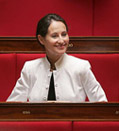 Just to go back to the start of it all quickly, on January 23, 2007 (the day before Ms. Royal’s fateful phone conversation with the French radio comedian pretending to be Quebec premier Jean Charest) the CBC News website in English-speaking Canada ran a piece called “Harper, Charest denounce Royal over comments about Quebec.”
Just to go back to the start of it all quickly, on January 23, 2007 (the day before Ms. Royal’s fateful phone conversation with the French radio comedian pretending to be Quebec premier Jean Charest) the CBC News website in English-speaking Canada ran a piece called “Harper, Charest denounce Royal over comments about Quebec.”
As the CBC explained, a few days earlier “Royal, the leader of the Socialist party in France, was asked by a Canadian reporter about Quebec sovereignty after a brief meeting she had with Parti Qubcois Leader Andr Boisclair in Paris … I’m in favour of it,’ she said in French. Liberty and sovereignty for Quebec reflect our shared common values.'” Now, the CBC went on, both Canadian federal “Prime Minister Stephen Harper and Quebec Premier Jean Charest” had sternly “rebuked France’s presidential candidate Segolene Royal after she appeared to offer sympathy for the idea of Quebec sovereignty.”
 Prime Minister Harper said “Experience teaches that it is highly inappropriate for a foreign leader to interfere in the democratic affairs of another country,” in “a statement on Monday [January 22].” He further pointed out “that Canada is looking forward to marking the 400th anniversary of the founding of Canada at Quebec City with the next president of France’ [in 2008] … But he added: We expect in turn that the next president will display an understanding of our shared history, and the respect for Canada and Canadians that such an important partnership requires.'”
Prime Minister Harper said “Experience teaches that it is highly inappropriate for a foreign leader to interfere in the democratic affairs of another country,” in “a statement on Monday [January 22].” He further pointed out “that Canada is looking forward to marking the 400th anniversary of the founding of Canada at Quebec City with the next president of France’ [in 2008] … But he added: We expect in turn that the next president will display an understanding of our shared history, and the respect for Canada and Canadians that such an important partnership requires.'”
For historical perspective, the CBC website noted in its report as well that: “In 1967, then-French president Charles de Gaulle, who was in Montreal for Expo ’67 and Canada’s Centennial, caused a political storm when he ended a speech from the balcony of Montreal’s city hall with Vive le Quebec libre (Long live free Quebec)’… Since then, French politicians have been careful to say that while they are not indifferent to Canada’s unity debate, they will not interfere.”
For his part Quebec federalist Liberal Premier Jean Charest (who will soon enough be facing the sovereigntist Parti Qubcois Leader Andr Boisclair, in a Quebec provincial election expected this year) “also denounced Royal’s comments, adding that he invited her to visit Quebec after she was elected leader of the Socialist party, but she refused … He said that as far as he knows, Royal has never visited the province … And furthermore, what I also know is that the future of Quebec will be decided by Quebecers. No one else.'”
 M. Boisclair himself, not surprisingly, “said the French understand his message of sovereignty and are sympathetic … I think Quebecers will interpret Mrs. Royal’s remarks for themselves,’ he said. It would be improper of me to do so but what people have seen is that France, in all circumstances, will be at Quebec’s side.'”
M. Boisclair himself, not surprisingly, “said the French understand his message of sovereignty and are sympathetic … I think Quebecers will interpret Mrs. Royal’s remarks for themselves,’ he said. It would be improper of me to do so but what people have seen is that France, in all circumstances, will be at Quebec’s side.'”
Meanwhile: Canadian “federal Liberal Leader Stphane Dion … said Royal’s comments hurt her credibility … She does not understand … You do not interfere in the affairs of a friendly country, you do not wish for the dismantling of a friendly country. Canada does not wish for the dismantling of France and France certainly does not wish for the dismantling of Canada.'”
(There is at least some perhaps qualified support for M. Dion’s view on what France wishes for in an “opinion poll published by the right-wing Le Figaro newspaper on Friday [January 26].” This “showed 68 per cent of the respondents thought Ms. Royal’s comments on Quebec had been wrong. Some 58 per cent attributed her statement to ignorance of the subject.”)
“Presidential hopeful falls for radio hoax”
 Public debate in France, it seems, has a kind of surrealistic vigor that is sadly lacking in, e.g., most anglophone countries – or even bilingual anglophone-francophone countries like Canada.
Public debate in France, it seems, has a kind of surrealistic vigor that is sadly lacking in, e.g., most anglophone countries – or even bilingual anglophone-francophone countries like Canada.
In any case, the dust had no sooner begun to settle on the “diplomatic row” between Canada and its earliest European mother country, when French radio comedian Grald Dahan, 33, “heaped fresh embarrassment on Sgolne Royal” by revealing how, while “pretending to be the prime minister of Quebec … he had fooled the Socialist candidate for the French presidency into making unguarded comments on the taboo subject of Corsican independence.”
M. Dahan’s hoax appears to have had its own ulterior political motives. As explained by the venerable Times of London: “Mr Dahan is reported to support Ms Royal’s rival [in the current French presidential race] Nicolas Sarkozy, leading Socialists to suggest that his sting was a ploy to distract attention from the Interior Minister’s difficulties. Mr Sarkozy has been accused of ordering the secret police to dig up dirt on opponents, including Ms Royal’s environmental adviser and her brother.”
 At the same time, for Ms. Royal Mr. Dahan’s amusing hoax is just “the latest mishap in an election campaign that even at this early stage – voting is not until April – is increasingly fraught.” She “has been especially prone to slips over foreign policy.” Her critics do urge that her telephone remarks to the fake Quebec premier about both Corsican and Quebec sovereignty, which have “followed blunders over the size of France’s nuclear submarine fleet, Chinese justice and Middle East politics,” have indeed “underlined the limits of her ability to lead the country.”
At the same time, for Ms. Royal Mr. Dahan’s amusing hoax is just “the latest mishap in an election campaign that even at this early stage – voting is not until April – is increasingly fraught.” She “has been especially prone to slips over foreign policy.” Her critics do urge that her telephone remarks to the fake Quebec premier about both Corsican and Quebec sovereignty, which have “followed blunders over the size of France’s nuclear submarine fleet, Chinese justice and Middle East politics,” have indeed “underlined the limits of her ability to lead the country.”
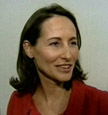 It is intriguing as well that the thirty-something Grald Dahan already has quite a track record with such telephone hoaxes. His “most famous … was in 2003 when he called Jean-Pierre Raffarin, then the Prime Minister, pretending to be Philippe Douste-Blazy, his Health Minister, and said that he had been caught by police in the Bois de Boulogne with a prostitute.” In 2005 “Mr Dahan adopted President Chirac’s voice to call Zindine Zidane, the French football captain, before a World Cup qualifying match against the Republic of Ireland. The false Mr Chirac asked the French team to sing La Marseillaise with their hands on their hearts – which they did.” Then: “Last year a senior Interior Ministry official mistook” M. Dahan “for Philippe de Villiers, the Eurosceptic leader.”
It is intriguing as well that the thirty-something Grald Dahan already has quite a track record with such telephone hoaxes. His “most famous … was in 2003 when he called Jean-Pierre Raffarin, then the Prime Minister, pretending to be Philippe Douste-Blazy, his Health Minister, and said that he had been caught by police in the Bois de Boulogne with a prostitute.” In 2005 “Mr Dahan adopted President Chirac’s voice to call Zindine Zidane, the French football captain, before a World Cup qualifying match against the Republic of Ireland. The false Mr Chirac asked the French team to sing La Marseillaise with their hands on their hearts – which they did.” Then: “Last year a senior Interior Ministry official mistook” M. Dahan “for Philippe de Villiers, the Eurosceptic leader.”
And finally, Canadians can take some pride in the news that last year too “Mr Chirac himself was tricked by a Quebecois humorist pretending to be Canadian Prime Minister Stephen Harper.”
Who is Sgolne Royal anyway?
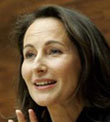 Whatever else she may or may not be, Sgolne Royal herself is quite an intriguing figure – and considerably more alluring in several respects than Hillary Clinton, who may or may not become the first female president of the USA, a little further down the road than this coming spring.
Whatever else she may or may not be, Sgolne Royal herself is quite an intriguing figure – and considerably more alluring in several respects than Hillary Clinton, who may or may not become the first female president of the USA, a little further down the road than this coming spring.
(Now, Hillary’s husband Bill and Sgolne Royal – that would be a match made in Hollywood, say by Franois Truffaut. Meanwhile Hillary herself might find some equivalent attraction to Franois Hollande, “currently first secretary of the French Socialist Party,” and a man whom Sgolne Royal first met when they were both attending the “cole nationale d’administration (ENA) along with much of France’s political elite,” many moons ago now. Sgolne and Franois Hollande have been since the late 1970s “while not married … bound by the PACS (pacte civil de solidarit), which provides for a civil union between two adults, regardless of gender.” And they have had four children together. Just what Franois Hollande (“sometimes jokingly called Monsieur Royal”) thinks of his civil-union partner’s current “presidential chances is anyone’s guess. Last year Mr Hollande had ambitions of his own to lead the country before being left trailing in the polls. As a result the subject is reportedly avoided in the family home.”)
 Sgolne Royal herself comes from anything but a traditional French left-wing or socialist family: “Born in Dakar, Senegal, in 1953, she was the fourth of eight children of a Catholic, conservative French army colonel who held strident rightwing and anti-feminist views … a colonel with a monocle and a shaved head.’ A stickler for discipline, he imposed on his tribe of children a harsh life of deprivations and punishments’ … Sgolne was the rebel who knew all about toughness and intransigence.”
Sgolne Royal herself comes from anything but a traditional French left-wing or socialist family: “Born in Dakar, Senegal, in 1953, she was the fourth of eight children of a Catholic, conservative French army colonel who held strident rightwing and anti-feminist views … a colonel with a monocle and a shaved head.’ A stickler for discipline, he imposed on his tribe of children a harsh life of deprivations and punishments’ … Sgolne was the rebel who knew all about toughness and intransigence.”
Ms. Royal nowadays also seems to have a knack for stirring public controversy, even beyond her growing list of foreign policy gaffes. Just this past August, with virtually all of France on its customary long summer vacations: “Paparazzi photographs of Socialist presidential hopeful Segolene Royal in a turquoise bikini … raised eyebrows.” One of the photographs appeared on the cover “of celebrity magazine Closer … as part of a survey of 50 stars at the beach.’ Its rival VSD followed up with a similar photo of Royal juxtaposed with a picture of Nicolas Sarkozy, the conservative … in next year’s presidential election, jogging on the beach over the headline: Duel in the sun’ … Both politicians are shrewd at using the media to push their image as modern politicians ready to breathe life into France’s hidebound political system and both have faced accusations they place style and image over substance.”
“Sego”‘s recent rise and fall … is she just a shooting star?
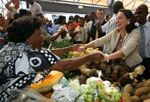 As recently as last spring, the New York Review of Books was telling interested North Americans that: “For next year’s presidential contest [in France] the Socialists present a half-dozen veteran politicians (with the avowedly retired Lionel Jospin a phantom candidate who might become a real one) and also the glamorous Sgolne Royal, who has never held a major office but during the first week in April was on all the magazine covers. The Socialists are divided, still lack a program, and remain tainted by the corruption that was part of the Mitterrand presidency.”
As recently as last spring, the New York Review of Books was telling interested North Americans that: “For next year’s presidential contest [in France] the Socialists present a half-dozen veteran politicians (with the avowedly retired Lionel Jospin a phantom candidate who might become a real one) and also the glamorous Sgolne Royal, who has never held a major office but during the first week in April was on all the magazine covers. The Socialists are divided, still lack a program, and remain tainted by the corruption that was part of the Mitterrand presidency.”
Not much more than a few months later Ms. Royal had become “the most mediagenic candidate in French history … undeniably beautiful and comfortably chic, wearing bright colors (from Paule Ka for the most part) that leave her gray-suited rivals in the shade. As a campaigner her stamina is stunning.” In the middle of November 2006 (less than two weeks after the Democratic surge in the US mid-term elections) she was officially chosen as the presidential candidate of the French Socialist party for 2007. As recently as late this past December we were being told that: “Last month Royal won the Socialist Party nomination by a landslide, not least because of her style. For a country weary of the same moldering male politicians-current President Jacques Chirac began his political career while Mao was still convulsing China-Royal is the face of change.”
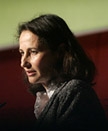 Since then things have not gone quite so well. As noted above, the glamorous Sgolne Royal’s latest early 2007 gaffes on Canada and Quebec are only part of a larger pattern that has emerged as the short strokes really begin. On Friday, January 26, 2006 no less than Time magazine was reporting that “Royal Loses Her Magic.” As Time explained: “Since her unlikely candidacy started gaining steam … Royal has had a penchant for … launching missiles of iconoclasm where least expected. Earlier this week, she managed the difficult trick of enraging even Canada, when she offered an endorsement of what she called the liberty and sovereignty of Quebec’ after meeting with the head of the separatist Parti Quebecois. Canadian Prime Minister Stephen Harper responded with a brusque reminder that meddling in domestic affairs was inappropriate for a foreign leader,’ and [now confirmed conservative presidential rival] Sarkozy’s camp could hardly contain its tut-tutting over Royal’s penchant for being extremely lightweight on important and sensitive subjects,’ as defense minister Michele Alliot-Marie put it.”
Since then things have not gone quite so well. As noted above, the glamorous Sgolne Royal’s latest early 2007 gaffes on Canada and Quebec are only part of a larger pattern that has emerged as the short strokes really begin. On Friday, January 26, 2006 no less than Time magazine was reporting that “Royal Loses Her Magic.” As Time explained: “Since her unlikely candidacy started gaining steam … Royal has had a penchant for … launching missiles of iconoclasm where least expected. Earlier this week, she managed the difficult trick of enraging even Canada, when she offered an endorsement of what she called the liberty and sovereignty of Quebec’ after meeting with the head of the separatist Parti Quebecois. Canadian Prime Minister Stephen Harper responded with a brusque reminder that meddling in domestic affairs was inappropriate for a foreign leader,’ and [now confirmed conservative presidential rival] Sarkozy’s camp could hardly contain its tut-tutting over Royal’s penchant for being extremely lightweight on important and sensitive subjects,’ as defense minister Michele Alliot-Marie put it.”
 Three quite recent opinion polls have all put Sarkozy ahead of Royal in the French presidential contest whose official first round of voting will finally arrive on April 22, 2007 – all by margins of 52% for Sarkozy vs. 48% for Royal. (There will be other candidates in the election but Sarkozy and Royal seem to have now emerged as the two main contenders, on the right and the left respectively.) As Time magazine puts it: “Royal has inspired enthusiasm, but to recover from her current slump, she’ll need to do more to inspire confidence.” (Meanwhile, the famed US publication notes as well: “When TIME asked Royal in the summer of 2006 what she thought of Hillary Clinton, she said she’d like to meet her, even though she holds some very right-wing positions.’ And what France could learn from the United States? There was a long pause before she answered: A spirit of enterprise, perhaps?'”)
Three quite recent opinion polls have all put Sarkozy ahead of Royal in the French presidential contest whose official first round of voting will finally arrive on April 22, 2007 – all by margins of 52% for Sarkozy vs. 48% for Royal. (There will be other candidates in the election but Sarkozy and Royal seem to have now emerged as the two main contenders, on the right and the left respectively.) As Time magazine puts it: “Royal has inspired enthusiasm, but to recover from her current slump, she’ll need to do more to inspire confidence.” (Meanwhile, the famed US publication notes as well: “When TIME asked Royal in the summer of 2006 what she thought of Hillary Clinton, she said she’d like to meet her, even though she holds some very right-wing positions.’ And what France could learn from the United States? There was a long pause before she answered: A spirit of enterprise, perhaps?'”)
“The Children’s Hour” in France last year
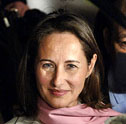 Back in the 1960s Canadian students of political science were taught that the then still rather new Fifth French Republic – which (as anglophones tend to see things) bizarrely blends both the British parliamentary and US presidential-congressional versions of modern democratic institutions – was “tailor-made” for its first and founding president, General Charles de Gaulle, and would likely enough not long outlive his career as the last great man of France.
Back in the 1960s Canadian students of political science were taught that the then still rather new Fifth French Republic – which (as anglophones tend to see things) bizarrely blends both the British parliamentary and US presidential-congressional versions of modern democratic institutions – was “tailor-made” for its first and founding president, General Charles de Gaulle, and would likely enough not long outlive his career as the last great man of France.
More than three and a half decades after the death of de Gaulle, however, the Fifth Republic is still very much in business. Something about having both a prime minister and a powerful president – in a way that mixes up what many anglophones at least used to regard as incompatible institutional principles – seems to appeal to the people of France. It may even be giving them somewhat more stable government than they enjoyed under any of the First, Second, Third, and Fourth Republics (to say nothing of the First and Second Empires, the Bourbon Restoration, or the Vichy regime during the Second World War).
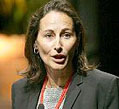 Earlier on, the current French president, Jacques Chirac, was apparently himself thinking of running for an unprecedented third term in 2007 – as was his colleague Prime Minister Dominique de Villepin. But less than a year ago now: “Over a month of demonstrations by French students, workers, and would-be workers … delivered a devastating blow to the government” presided over by both men. It “was forced to withdraw its new law meant to increase employment opportunities for young people lacking formal qualifications. Hundreds of thousands-the organizers say millions- ” were “in the streets of cities across the country. Students left their classes and blocked others from attending. Some universities and lyces shut down to prevent violence between striking students and those anxious to study for impending examinations. The Sorbonne’s auditorium was temporarily occupied, and classrooms there and elsewhere trashed … Foreign observers were waiting for the revolution.”
Earlier on, the current French president, Jacques Chirac, was apparently himself thinking of running for an unprecedented third term in 2007 – as was his colleague Prime Minister Dominique de Villepin. But less than a year ago now: “Over a month of demonstrations by French students, workers, and would-be workers … delivered a devastating blow to the government” presided over by both men. It “was forced to withdraw its new law meant to increase employment opportunities for young people lacking formal qualifications. Hundreds of thousands-the organizers say millions- ” were “in the streets of cities across the country. Students left their classes and blocked others from attending. Some universities and lyces shut down to prevent violence between striking students and those anxious to study for impending examinations. The Sorbonne’s auditorium was temporarily occupied, and classrooms there and elsewhere trashed … Foreign observers were waiting for the revolution.”
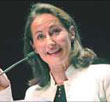 As with similar situations in France over the recent and somewhat less recent past, in the end the revolution did not come. But the “political implications” of the youth demonstrations, the excellent American international journalist William Pfaff urged in a May 11, 2006 article called “France: The Children’s Hour,” were “that President Chirac’s retirement … now seems assured. Prime Minister Villepin’s presidential ambitions for 2007 can probably be forgotten” as well. And as it has happened Nicolas Sarkozy has become the official candidate of the same centre-right Union for a Popular Movement (UMP) that has been home to both Chirac and Villepin.
As with similar situations in France over the recent and somewhat less recent past, in the end the revolution did not come. But the “political implications” of the youth demonstrations, the excellent American international journalist William Pfaff urged in a May 11, 2006 article called “France: The Children’s Hour,” were “that President Chirac’s retirement … now seems assured. Prime Minister Villepin’s presidential ambitions for 2007 can probably be forgotten” as well. And as it has happened Nicolas Sarkozy has become the official candidate of the same centre-right Union for a Popular Movement (UMP) that has been home to both Chirac and Villepin.
As made clear enough by both the 2006 youth marches and demonstrations in France and the somewhat earlier late 2005 “car-burning disorders provoked … by the young immigrant [and often Muslim] poor who occupy the public-housing ghetto suburbs of major French cities,” France these days does have some problems. But what country or region of the global village doesn’t have problems of one sort or another at the moment? (Canada included, of course.)
The good news about France and Canada and Quebec today … ?
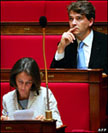 Meanwhile, Canadians can quite arguably take comfort from various aspects of the recent adventures of the French Socialist candidate for president in 2007, Sgolne Royal. Whatever else she may or may not be, Ms. Royal is certainly intriguing. And her latest somewhat surreal and uncalculated bumps into the increasingly somewhat surreal Canadian domestic issue of Canada and its unique predominantly French-speaking sovereign province of Quebec have helped brighten the traditionally drab month of January – in the second largest national geographic territory of the world today, long ago dismissed by Voltaire as “a few acres of snow.”
Meanwhile, Canadians can quite arguably take comfort from various aspects of the recent adventures of the French Socialist candidate for president in 2007, Sgolne Royal. Whatever else she may or may not be, Ms. Royal is certainly intriguing. And her latest somewhat surreal and uncalculated bumps into the increasingly somewhat surreal Canadian domestic issue of Canada and its unique predominantly French-speaking sovereign province of Quebec have helped brighten the traditionally drab month of January – in the second largest national geographic territory of the world today, long ago dismissed by Voltaire as “a few acres of snow.”
Ms. Royal’s adventures have also yet again raised the poignant question of where would Canada today be without Quebec, and vice-versa? Much has happened over the past 40 years, since “then-French president Charles de Gaulle, who was in Montreal for Expo ’67 and Canada’s Centennial, caused a political storm when he ended a speech from the balcony of Montreal’s city hall with Vive le Quebec libre’.” It is clear that Segolene Royal is no Charles de Gaulle – and Andre Boisclair is no Rene Levesque. It wasn’t M. Boisclair who asked Ms. Royal about Quebec sovereignty. It was a Canadian journalist looking for some red-meat copy to send back home.
 M. Boisclair, who is presumably immune to Ms. Royal’s most superficial attractions (unlike Bill Clinton), may lead his not exactly dynamic 39-year old Parti Quebecois to some kind of victory in the next Quebec provincial election, also expected some time this year. Or he may not. But so what if he does? Ms. Royal has already clarified that her support for the “principles of sovereignty and freedom” in Quebec does not “refer to institutional reforms.” Who can be against freedom for anyone, of course. (And all Canadian provinces are already sovereign, with respect to their jurisdictions as spelled out in the Constitution Act 1867 – and as interpreted by subsequent trained legal minds. And, thanks to Quebec itself as well as various accidents of the later 19th century, Canadian provinces today can claim quite a lot of jurisdictions, if and when they choose to fill them.)
M. Boisclair, who is presumably immune to Ms. Royal’s most superficial attractions (unlike Bill Clinton), may lead his not exactly dynamic 39-year old Parti Quebecois to some kind of victory in the next Quebec provincial election, also expected some time this year. Or he may not. But so what if he does? Ms. Royal has already clarified that her support for the “principles of sovereignty and freedom” in Quebec does not “refer to institutional reforms.” Who can be against freedom for anyone, of course. (And all Canadian provinces are already sovereign, with respect to their jurisdictions as spelled out in the Constitution Act 1867 – and as interpreted by subsequent trained legal minds. And, thanks to Quebec itself as well as various accidents of the later 19th century, Canadian provinces today can claim quite a lot of jurisdictions, if and when they choose to fill them.)
Moreover, in the second act of her Canada-Quebec drama – in her phone conversation with the fake Quebec premier Jean Charest – Ms. Royal has clarified that the deepest truth of her point is largely a matter of postmodern humour. And this kind of humour is something that Canadians inside and outside Quebec have at least lately even begun to grasp themselves. Some time ago now, the Queb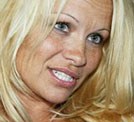 ecois comedian Yvon Deschamps quipped that what Quebec really wants is “an independent Quebec in a united Canada.” Late this past year the Canadian House of Commons overwhelmingly passed a motion which may or may not have said the same thing. (Whatever this may mean, when it does not refer to “institutional reforms”?)
ecois comedian Yvon Deschamps quipped that what Quebec really wants is “an independent Quebec in a united Canada.” Late this past year the Canadian House of Commons overwhelmingly passed a motion which may or may not have said the same thing. (Whatever this may mean, when it does not refer to “institutional reforms”?)
Finally, and most importantly, the great 19th century French historian Jules Michelet long ago came up with a dazzling aphorism, that General de Gaulle would also later adopt as his philosophy of history. “England,” Michelet said, “is an empire, Germany a race, a country; France is a person.” Who knows just what this means either? But it is certainly a wonderful thing. And part of the reason the glamorous Sgolne Royal at least briefly became “the most mediagenic candidate in French history” a few months ago, it would seem, is that she has somehow managed to express something about the person that France is today.
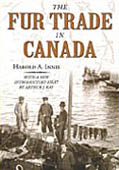 In the very end it is a wonderful thing too that Canada – for as long as it shall live – still has and will always have some kind of connection with this person. In this as in other respects Quebec makes all of Canada a more interesting place in which to live, work, and worship the idols of your choice – and vice-versa. Perhaps if Sgolne Royal does recover her earlier mediagenic qualities and become the first female president of France this spring, she will start to see that this is the ultimate truth behind the freedom and sovereignty she supports. The 21st century is going to be quite different from the 20th century. General de Gaulle’s day, like that of the old Colonel Royal in Sengal, is gone forever. We just don’t know yet just what is replacing it, around the world. In France it still could be Sgolne Royal. So far she isn’t that far behind in any of the polls.
In the very end it is a wonderful thing too that Canada – for as long as it shall live – still has and will always have some kind of connection with this person. In this as in other respects Quebec makes all of Canada a more interesting place in which to live, work, and worship the idols of your choice – and vice-versa. Perhaps if Sgolne Royal does recover her earlier mediagenic qualities and become the first female president of France this spring, she will start to see that this is the ultimate truth behind the freedom and sovereignty she supports. The 21st century is going to be quite different from the 20th century. General de Gaulle’s day, like that of the old Colonel Royal in Sengal, is gone forever. We just don’t know yet just what is replacing it, around the world. In France it still could be Sgolne Royal. So far she isn’t that far behind in any of the polls.

